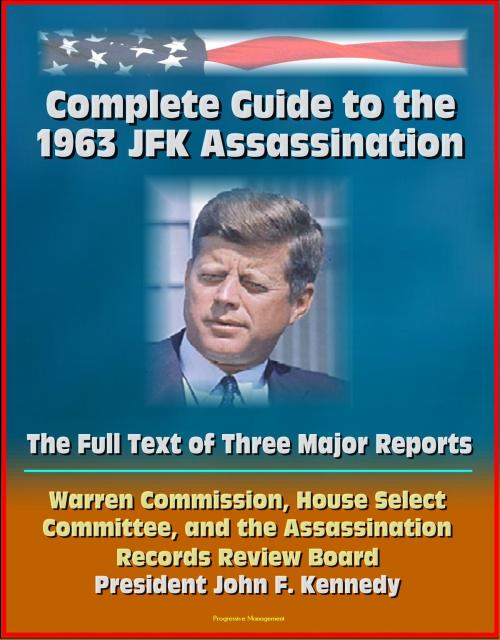Complete Guide to the 1963 JFK Assassination: The Full Text of Three Major Reports - Warren Commission, House Select Committee, Assassination Records Review Board - President Kennedy
Nonfiction, History, Modern, 20th Century, Social & Cultural Studies, Political Science| Author: | Progressive Management | ISBN: | 9781301420179 |
| Publisher: | Progressive Management | Publication: | April 16, 2013 |
| Imprint: | Smashwords Edition | Language: | English |
| Author: | Progressive Management |
| ISBN: | 9781301420179 |
| Publisher: | Progressive Management |
| Publication: | April 16, 2013 |
| Imprint: | Smashwords Edition |
| Language: | English |
All of the controversial aspects of the assassination of President Kennedy are examined in these three critical reports: the original Warren Commission report, the report of the Select Committee on Assassinations of the U.S. House of Representatives in 1979, and the Assassination Records Review Board report of 1998.
Warren Commission: Appointed by President Johnson after the assassination, The Commission reviewed reports by the Federal Bureau of Investigation, Secret Service, Department of State, and the Attorney General of Texas, and then requested additional information from federal agencies, Congressional committees, and state and local experts. The Commission held hearings and took the testimony of 552 witnesses. On several occasions, the Commission went to Dallas to visit the scene of the assassination and other places. The Commission presented its Report, in which each member concurred, to the President on September 24, 1964.
Select Committee: The House Select Committee on Assassinations was established in September 1976 by House Resolution 1540, 94th Congress, 2d Session. The resolution authorized a 12-member select committee to conduct a full and complete investigation of the circumstances surrounding the deaths of President John F. Kennedy and Dr. Martin Luther King, Jr. The committee was constituted for the four remaining months of the 94th Congress. This report presents the committee's analysis and synthesis of the evidence the committee obtained on all four issues the committee deemed necessary to fulfill its mandate. The committee issues this report to fulfill its legislative and informing responsibilities under the Constitution.
Assassination Records Review Board: This panel was formed as a result of the 1992 President John F. Kennedy Records Collection Act. "The Review Board has worked hard to obtain all records relating to the assassination of President Kennedy and to release the records to the fullest extent possible to the American people. The Board and its staff have contributed significant professional and personal time to this important effort. We have done so in the hope that release of these records will shed new evidentiary light on the assassination of President Kennedy, enrich the historical understanding of that tragic moment in American history, and help restore public confidence in the government's handling of the assassination and its aftermath. The Review Board's Final Report is unanimous. It summarizes the Board's experience in interpreting and applying this unique way to provide broad access to government records. Most importantly, it illuminates the Review Board's legacy—the John F. Kennedy Assassination Records Collection at the National Archives." Contents: Chapter 1: The Problem of Secrecy and the Solution of the JFK Act * Chapter 2: Establishment of the Review Board and Definition of "Assassination Record" * Chapter 3: Public Activities of the Assassination Records Review Board * Chapter 4: Developing the Review Process * Chapter 5: The Standards for Review: Review Board "Common Law" * Chapter 6, Part I: The Quest for Additional Information and Records in Federal Government Offices * Chapter 6, Part II: Clarifying the Federal Record on the Zapruder Film and the Medical and Ballistics Evidence * Chapter 7: Pursuit of Records and Information from Non-Federal Sources * Chapter 8: Compliance with JFK Act by Government Offices
All of the controversial aspects of the assassination of President Kennedy are examined in these three critical reports: the original Warren Commission report, the report of the Select Committee on Assassinations of the U.S. House of Representatives in 1979, and the Assassination Records Review Board report of 1998.
Warren Commission: Appointed by President Johnson after the assassination, The Commission reviewed reports by the Federal Bureau of Investigation, Secret Service, Department of State, and the Attorney General of Texas, and then requested additional information from federal agencies, Congressional committees, and state and local experts. The Commission held hearings and took the testimony of 552 witnesses. On several occasions, the Commission went to Dallas to visit the scene of the assassination and other places. The Commission presented its Report, in which each member concurred, to the President on September 24, 1964.
Select Committee: The House Select Committee on Assassinations was established in September 1976 by House Resolution 1540, 94th Congress, 2d Session. The resolution authorized a 12-member select committee to conduct a full and complete investigation of the circumstances surrounding the deaths of President John F. Kennedy and Dr. Martin Luther King, Jr. The committee was constituted for the four remaining months of the 94th Congress. This report presents the committee's analysis and synthesis of the evidence the committee obtained on all four issues the committee deemed necessary to fulfill its mandate. The committee issues this report to fulfill its legislative and informing responsibilities under the Constitution.
Assassination Records Review Board: This panel was formed as a result of the 1992 President John F. Kennedy Records Collection Act. "The Review Board has worked hard to obtain all records relating to the assassination of President Kennedy and to release the records to the fullest extent possible to the American people. The Board and its staff have contributed significant professional and personal time to this important effort. We have done so in the hope that release of these records will shed new evidentiary light on the assassination of President Kennedy, enrich the historical understanding of that tragic moment in American history, and help restore public confidence in the government's handling of the assassination and its aftermath. The Review Board's Final Report is unanimous. It summarizes the Board's experience in interpreting and applying this unique way to provide broad access to government records. Most importantly, it illuminates the Review Board's legacy—the John F. Kennedy Assassination Records Collection at the National Archives." Contents: Chapter 1: The Problem of Secrecy and the Solution of the JFK Act * Chapter 2: Establishment of the Review Board and Definition of "Assassination Record" * Chapter 3: Public Activities of the Assassination Records Review Board * Chapter 4: Developing the Review Process * Chapter 5: The Standards for Review: Review Board "Common Law" * Chapter 6, Part I: The Quest for Additional Information and Records in Federal Government Offices * Chapter 6, Part II: Clarifying the Federal Record on the Zapruder Film and the Medical and Ballistics Evidence * Chapter 7: Pursuit of Records and Information from Non-Federal Sources * Chapter 8: Compliance with JFK Act by Government Offices















